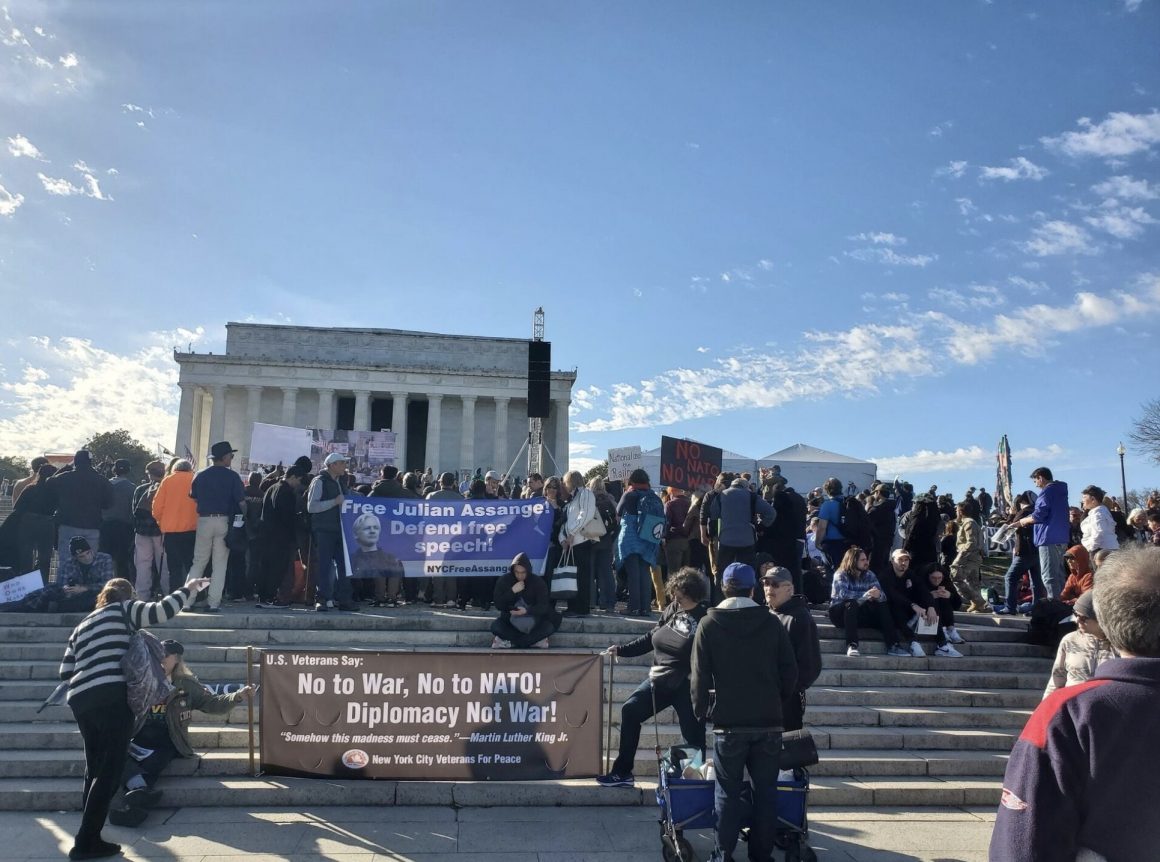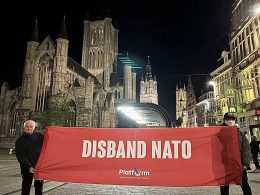To say that the left lacks ownership over the modern antiwar movement isn’t even to make an ideological statement. It’s simply an observation about the objective conditions of today’s American political landscape. A realignment has been occurring within the consciousness of the country’s people; one where in response to the new cold war and its effects, tens of millions of individuals who aren’t on the left have permanently become part of the element that opposes our government’s militarism. This doesn’t mean they all consciously oppose U.S. hegemony, at least not yet; that will require a further advancement in their education. It does mean, though, that such an educational project would be successful when applied to this element of the people.
And this shows that as communists, we need to advance our anti-imperialist agenda with an intent to reach more people than leftists; we need to build a relationship with the people in general, especially the most conscious element. That element includes anyone who’s so far managed to figure out that the war machine needs to be combated; a category of individuals who now are largely made up of political people that aren’t on the left.
This reality at first appears paradoxical; why are so many of those who lean to the right presently more inclined than apolitical people to oppose the war machine? Isn’t it the case that the more to the right someone is, the more they support existing institutions? Not necessarily, because politics and ideology aren’t determined by simplistic frameworks for categorizing who’s going to believe what; they’re determined by which material interests are either aligned with someone’s class status, or are behind the informational sources which influence the way they think. As communists, the class whose interests we seek to advance is the proletariat, unlike how the Libertarian Party (in terms of its economic stances) seeks to advance the class interests of the bourgeoisie. So we’re anti-imperialists for different reasons than they are; but why do we share such a significant trait? Why do we both want to end U.S. hegemony?
Answering this can let us understand what motivates this new base of right-leaning people who are antiwar, including the element of it that’s working class. Thereby, we can become better able to bring these people to Marxist beliefs, including to the socially progressive values that modern Marxists uphold. A shared desire to end American dominance can be a highly effective starting place for somebody to become a communist, even if they identify with an ideological orientation that’s (supposedly) further from communism than the orientation of the liberals.
To try to find an explanation for this commonality between Marxists and many modern conservatives, I returned to an area of research that I was familiar with prior to having become a Marxist: Russiagate. This psyop, focused on bringing more liberals and leftists to the neoconservative view of world affairs, exposed America’s political realignment. It showed that whereas plenty of those on the “left” are willing to become obstinate pro-imperialists, plenty of those who these leftists would dismiss as irredeemable reactionaries are compatible with anti-imperialism.
While writing about Russiagate’s nature as a narrative designed to appeal to liberal elites, Consortiumnews contributor Phil Rockstroh observed how many of the people outside these elite circles can be brought to progressive or even revolutionary ideas:
On a personal basis, liberals with whom I used to clash when I was a resident of Manhattan, almost to a person, were completely removed from and, worse, utterly incurious, about the lives of the working class. When traveling around my native South, for example, when visiting my wife’s family in the rural South Carolina Low Country, I found the people there far more receptive to a socialist critique of the capitalist order than that of liberals. Why? Unlike upscale liberals, the working class, on a day-by-day basis, endure perpetual humiliation under depraved capitalism. Why do liberals refuse to acknowledge class-based deprivation as a defining factor in the angst and animus of the laboring class?…there is a howling, class chasm between the cultural criteria that separates affluent liberals from the struggling laboring class. How could sneaky Vladi and his fake news-wielding squads of internet Cossacks be responsible for the neoliberal economy, comprised of low wage, no benefits, no future mcjobs, that plague the working life of the latter? Thus the Russiagate storyline holds little resonance for downscale working people.
Due to the different ways that the opposing class interests of the country’s demographic groups make them inclined to respond to the new cold war’s propaganda, it’s been comfortable liberals who’ve become more pro-imperialist, inverse to many working class conservatives. And because the Republican Party is incurably pro-imperialist in its structure, the Libertarian Party has taken the role as the representative of non-left antiwar sentiments. Even though the libertarians continue to domestically put forth an agenda that’s in the interests of the bourgeoisie, the global part of their agenda is in the interests both of the bourgeoisie’s antiwar elements, and of the working class. (Because the end of U.S. hegemony, due to its weakening the American bourgeois state, would necessarily represent a win for the U.S. proletariat.) As a consequence, the libertarians have become able to work with the communists on building the anti-imperialist movement, and on bringing anti-imperialist ideas to the people.
Many of these libertarians, as well as many within the broader antiwar conservative element, are not part of the struggling laboring class; that doesn’t mean they haven’t been able to assist in the fight against U.S. hegemony, which is an instrumental part of the effort to defeat the capitalist state. It also doesn’t mean there aren’t many working class people who share ideas like libertarianism, and who are compatible with the anti-imperialist cause.
Those within this category are particularly to be found within the armed forces, or within the population of veterans; that’s because even though the insular left rejects them as eternally untrustworthy, their upbringings and experiences have given them an incredible amount of revolutionary potential. They’re the ones who’ve joined the military due to the “poverty draft,” and who therefore don’t have comfortable economic situations to return to after they come home. This can easily lead them to class consciousness, as has been the case for all the past armed service members who’ve had essential roles in helping with history’s successful workers revolutions.
The conservatives from bourgeois backgrounds who’ve taken an antiwar stance are motivated by concerns that make practical sense for them, but that don’t pertain to desperate socioeconomic situations like is the case for working class people. They’re upset about their taxes funding wars, and about their government creating a danger of nuclear war. As a consequence, they often only oppose one half of the new cold war, rejecting the anti-Russia psyops while embracing the psyops against China. This shows the limitations on the anti-NATO coalition; because people often (with exceptions) need to come to communism in order to reject all of the propaganda against China. And the only bourgeois people that come to communism are the ones who make the extraordinary decision of becoming traitors to their class.
The coalition is still worth joining though, because platforms like the one the libertarians have are our only realistic avenue for reaching everyone within the most conscious element of the workers. That being the element which has already come to the anti-imperialist perspective on issues like NATO, and which due to its class interests can then easily come to pro-Chinese communism.
Armed service members make up a great deal of those within this highly revolution-compatible element; they’re not just disproportionately working class, but have experienced things that often make them deeply disillusioned with the imperial order. They’re like the antiwar-minded Colonel Douglas Macgregor, except they usually have a proletarian lifestyle; and, therefore, can come to Marxism even if they start as right-wing.
The insular, imperialism-compatible leftists act like America is exceptional; like exclusively in this country, revolutionaries can expect to win while not reaching out to the armed service members. They reject this historically proven practice, for the same reason they reject Lenin’s practice of entering into coalitions that focus on the moment’s most pivotal struggles. This reason is that these leftists seek not to win, but to stay consistent with a contemporary “left” orthodoxy. Marxists need to break from this orthodoxy, and act according to how the conditions prompt us to act.
————————————————————————
If you appreciate my work, I hope you become a one-time or regular donor to my Patreon account. Like most of us, I’m feeling the economic pressures amid late-stage capitalism, and I need money to keep fighting for a new system that works for all of us. Go to my Patreon here.
To keep this platform effective amid the censorship against dissenting voices, join my Telegram channel








